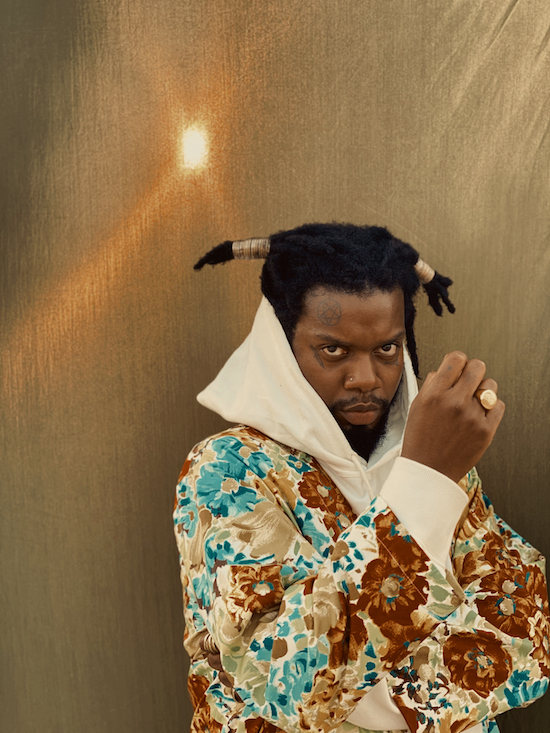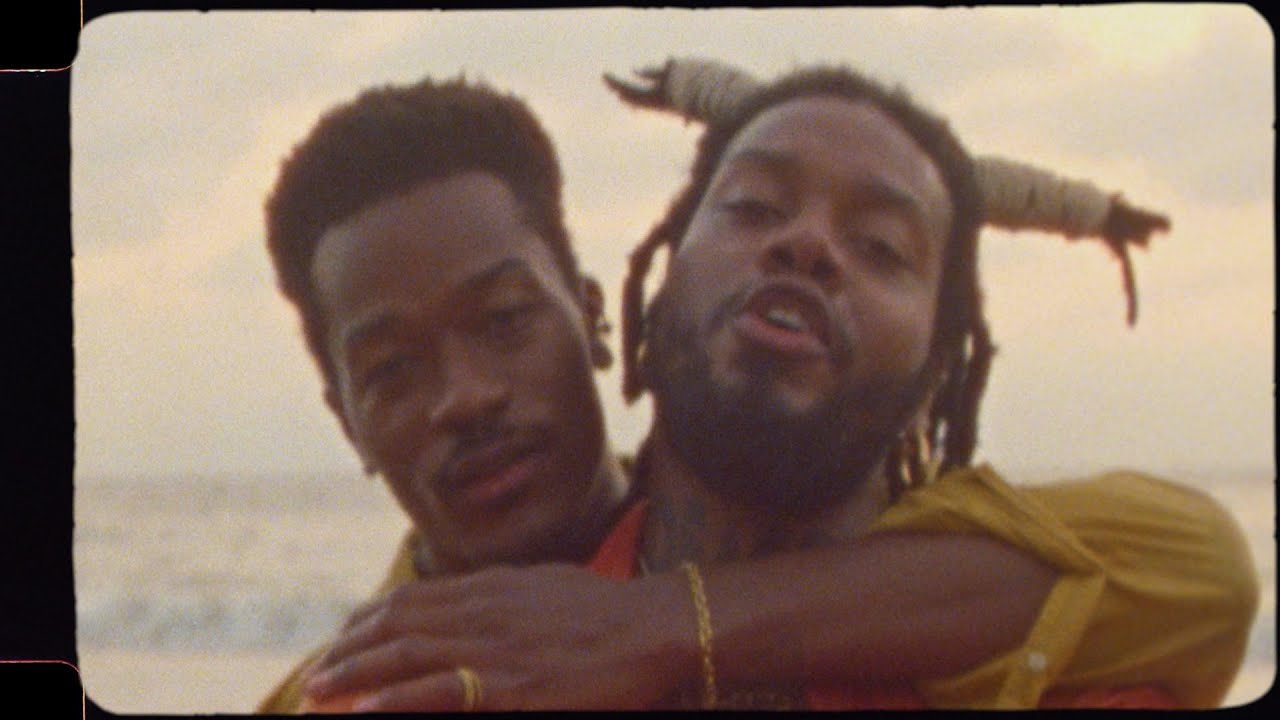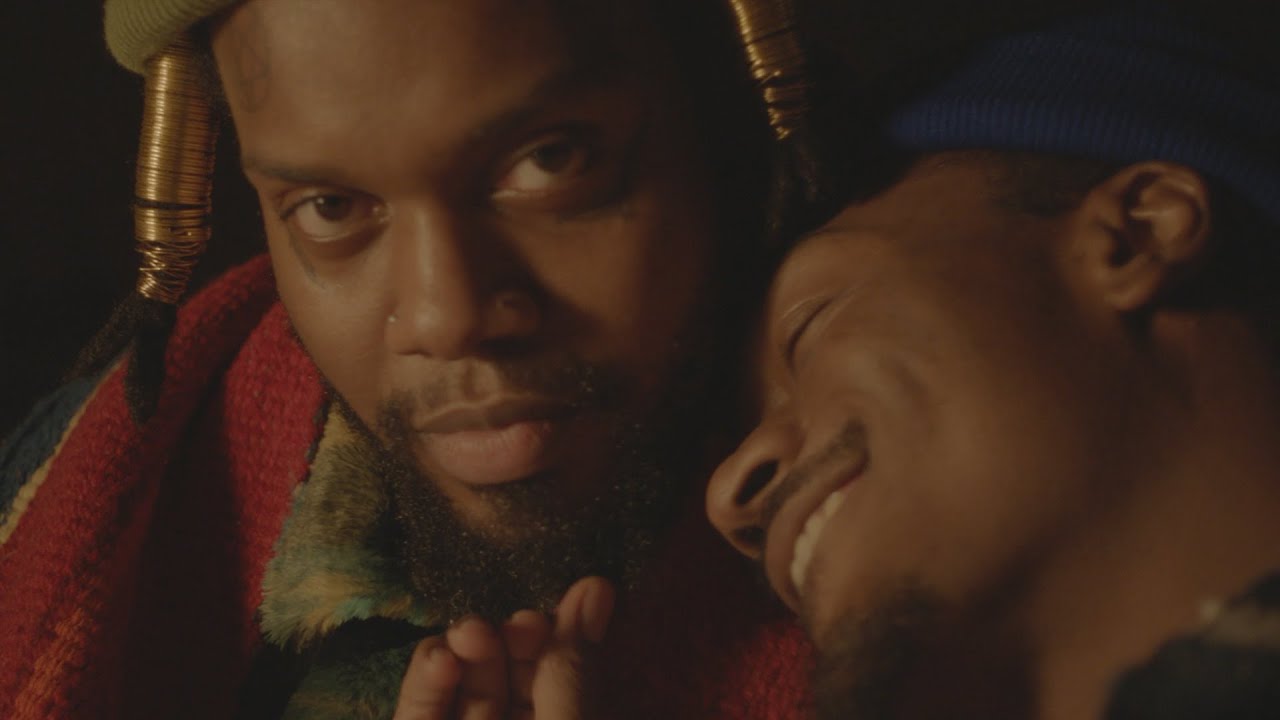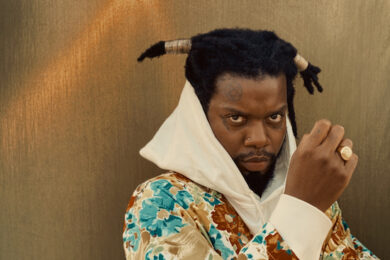“Caring for myself is not self-indulgence. It is self-preservation, and that is an act of political warfare.”
Audre Lorde
Discussing her cancer diagnosis in 1988 collection A Burst Of Light: And Other Essays, the author Audre Lorde frames self-care as an act of rebellion, asserting her worth as a Black, gay woman in a society that fosters and rewards homogeneity. This idea of viewing vulnerability as strength is also the premise of Lora Mathis’ 2015 photo collection Radical Softness, in which the feminist poet/ photographer spells out slogans like, “The shaming of feelings is not helping anyone”, and, “Stay soft”, amongst soft-focus floral arrangements.
Though serpentwithfeet is by no means the first to explore the idea of soft-power in popular music – see the gentle self-empowerment of Solange’s ’Cranes In The Sky’, or Charli XCX flipping the male gaze in the baby-pink ’Boys’ video – his decision to release a record rhapsodising about the beauty of Black love at a time when white societies are finally being forced to acknowledge systemic racism feels particularly poignant. And with the album’s Sampha and Lil Silva-starring lead single ‘Fellowship’ recently playlisted on BBC Radio 1, serpent’s tender take on rebellion is already infiltrating the mainstream.
Speaking over Zoom on a Saturday afternoon from his home in L.A., the Baltimore-musician born Josiah Wise admits he simply couldn’t have written a record like DEACON before now. “I had to develop a gentle touch because I was much more aggressive in past years.” He laughs, “It’s like a giant trying to have a caterpillar friend, but he keeps smashing it because he’s too rough. That was me. For years I wanted the cute little ladybug friend, but I kept killing it.”
Certainly, the serpent of DEACON feels a very different proposition to the “tattooed occultist” of 2016’s Haxan Cloak-produced Blisters EP. Back then he was viewed as something of an oddity; a classically-trained tenor exploring experimental, electronics-tinged gospel music. He’s a different proposition too to the serpent who wrote 2018’s soil, an 11-track collection fusing sinuous R&B with haunted chamber-pop, and featuring contributions from Clams Casino, Paul Epworth, and Katie Gately.
Recorded between 2018 and 2019 in London and L.A., serpent’s second album offers a series of sensuous, sun-dappled devotionals, infused with the warmth of late 70s Stevie Wonder and Brazilian bossa nova composer Antônio Carlos Jobim. Where previously his curlicued, choir-boy riffing tended to dominate proceedings, on DEACON his vocals are mellower and more sinuous, accentuating the record’s relaxed atmosphere. This mood is further reflected in the choice of album title, which channels the “self-possession and supreme calmness” of the deacons serpent encountered growing up in the Pentecostal Church.
As he explains, the landscape of DEACON appeared in his mind fully-formed shortly after the release of soil. “With the colour palette, I immediately knew I wanted lots of beiges and off-whites and creams and lots of sun. And I knew that we needed to do the album cover shoot in daylight, outside, because I wanted to make warm, gentle music. There’s a reason why I love Stevie Wonder and Jobim: it’s because there’s a softness, there’s a gentleness, there’s a care in their work. I always feel really nurtured and held when I listen to them, and I wanted to attempt something like that.”
Also influential was the manner in which Wonder and Jobim each commune with the natural world within their work, most notably on Journey Through The Secret Life of Plants and Passarim. “I wanted the work to feel like I was in nature now, which is why I have a song like ‘Hyacinth’ or why I wanted ‘Dawn’ to feel like the dawn chorus in L.A. Waking up at 5.30am to the sound of birds in L.A. is one of the most beautiful experiences: seeing the way the palm trees sway, seeing the sunrise, seeing the hummingbirds.”
As well as displaying this deep, unhurried tenderness, DEACON finds serpent focused on exploring more traditional pop song structures, a development influenced by his activities since soil, which have included remixing Björk, and collaborations with Ty Dolla Sign, Virgil Abloh and Ellie Goulding, plus a gig singing at the latter’s high society wedding. In fact, this increased demand for his songwriting services is part of the reason he relocated from New York to L.A. between albums.
“I love going to sessions and witnessing other people’s processes,” he enthuses. “Being around the magic, you can’t help but learn something. And I found myself being really moved by a lot of different songwriters’ work. It was like, ok, this is a pop structure, and these aren’t some crazy chords or whatever, but these songs still hit. Coming from my background in classical music and freeform jazz, sometimes you fall in love with the sinuous structure. But there’s something to be said about simple song structures, and all the depth you can put in the lyrics. There’s a lot of powerful, powerful pop music. [A song] doesn’t have to become this 10-minute-long epic to have an impact.
“I just wanted to explore what a pop song looks like for me because I love super-saccharine pop music. I love Beyoncé’s ‘Halo’. I love Robyn’s ‘Call Your Girlfriend’. But I’ve played songs to friends and they’re like, ‘This is your version of bubblegum?!’ So maybe my version of bubblegum-pop is like really tart tea for some people.”
What makes serpent’s new, streamlined approach to songwriting feel truly fresh is his choice of subject matter. Solely focused on positive stories of Black love, DEACON might be one of the first R&B records not to mention heartbreak at all. As a collection it’s overwhelmingly empathetic and uplifting, scattered with affirmations like, “I’m ready for the road before us” (‘Old & Fine’), and, “I’m thankful for the love I share with my friends” (‘Fellowship’), and yet somehow never feels mawkish. And all permutations of love are explored, from flirtation (‘Amir’, ‘Malik’), lust (‘Wood Boy’, ‘Heart Storm’), and can’t-live-without-you infatuation (‘Derrick’s Beard’) to friendship (‘Fellowship’). It’s all a far cry from the artist who once proudly declared, “I want to make a pageant of my grief.”
In some respects, DEACON’s utopian vision feels almost Afrofuturist, but today serpent is reluctant to claim the title. “I mean, I’m definitely here for Afrofuturism but this is just my world: in my world Black love is paramount. And I think it was just important for me to create my version of a love letter to Black gay folks. I’ve loved and I’ve been loved, and I wanted this to be a document of that.”
And yet, with the record arriving off the back of a catastrophic 12 month-period that saw George Floyd and Breonna Taylor murdered by police, more than 74 million people voting for Donald Trump, and the outbreak of a pandemic that truly revealed the structural imbalances in America in terms of class and race, DEACON’s unfettered celebration of Black love feels innately political, not least because it portrays Black people publicly experiencing something other than trauma. Ask serpent about how much he was affected by the political climate surrounding the album, however, and he’s noticeably non-committal.
“I mean, I’ve always been Black, and I’ve known I was gay since I was, like, six. And yeah, the world is not always the most pleasant place, so I think when I make work that’s always there. It’s like, I don’t live in a bubble, and I don’t wish to live in a bubble. But I don’t think that I’m setting out to do something that hasn’t been done. I think people have already done the work; I’m just adding my two cents.”
Serpent acknowledges many of his Black, queer forebears in the promo for brilliant single ‘Same Size Shoe’, including choreographer Jonte’ Moaning, the directors Patrik-Ian Polk and Marlon Riggs, the authors Joseph Beam and Essex Hemphill, and the cast of mid-00s drama Noah’s Arc. The video itself offers a tender portrayal of queer domesticity rarely seen in pop promos. Discussing serpent’s decision to exclusively date Black men – because only they can relate to his experiences – the song’s message of Black allyship is felt most profoundly in lines like, “Never heard truth come from skinny lips,” and, “Can’t love no man ’til I measured his feet.”
Throughout the record, Serpent renders relationships with startling realism, sketching intimacy on ‘Fellowship’ in trivial details like “Our fascination with prosecco/ The silly face you make when I say hello.” Rather than idealised fantasies or convenient stereotypes, the characters described feel like they’re made of real flesh and blood – from the man with the “loving love handles” on ‘Malik’, to ‘Hyacinth’s object of affection who “never played football, but look at how he holds me.” Throughout, there’s a vulnerability that’s every bit as authentic as it is deeply uncool.
“I think playing it cool can be a trap,” he agrees. “So I wanted to make space for people who aren’t trying to play it cool all the time. This might be a little self-involved, but maybe that’s the blessing of my 30s: I’m not trying to challenge things anymore, but I am trying to be more honest. And I’m here for love handles, you know! I like a guy who’s kinda corny!”
Mostly, serpent’s done with any kind of posturing. “There’s this thought that if you make songs that are too optimistic that it’s corny, or that there’s not an artistic merit there; that making woebegone, dispirited music is the only authentic art. And I’ve made a lot of sad music so I know that there is power there, but I also think there’s power in saying, ‘I had a great fucking day. And I had the best orange juice that had a lot of pulp. And I had a lot of flowers on my table while I ate. And we laughed a lot.’ Like, that can be corny, but it’s also a wonderful moment, and one that’s of no less merit than, ‘I lost everything and I don’t know what I’m going to do next.’ Those are both valid moments. So I just wanted to remind myself that this joy that I felt is valid.”
That joy is infectious, and when combined with a more accessible melodic structure, it feels like DEACON could be serpent’s crossover record. From the taster he’s had so far, just how comfortable is he operating in the pop realm?
“I’m comfortable with me. I don’t think anyone has asked me to do anything differently, and I think that’s why it’s easy. I mean, I can’t speak for pop artists that have been in the industry since they were 12. But I started out in my late 20s, doing things that people considered as left of centre. So I think I’ve always been given permission to do what I want, and I’m still doing what I want. You know, I want to make things that are accessible, but also that still resonate with me. And with every project I try to scare myself, because as an artist if you don’t scare yourself, you aren’t writing.”





